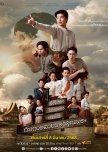Promoted as ละครคอมเมดี้ ย้อนยุค "Historical Comedy Lakorn", this drama, in typical Thai fashion, combines several "western" genres:
* comedy
* crime / detective
* lakorn
It also criticises classism and sexism, and the resulting power imbalance and the injustice of the (Thai) judicial system. And it has a ghost. Of course it has.
Overall, it was an engaging watch -- the characters, from the three main characters to the supporting characters, were interesting, and I rooted for Thongbai, Maiphlong and Sangthong. The way the story was told, with all its twists and turns, made me want to know the culprit. And at the same time, I enjoyed the journey of it, the emotional highs and lows, the drama and the comedy.
The latter is something not everybody might get along with: (Melo)Drama goes hand in hand with the comedy, the mood often switches from one to the other within the same scene and without any warning. I myself like this style, I must say, and I have always preferred my crime&mystery with a side of comedic relief and my comedy with a bit of depth. The writing was very consistent in that regard, and even though the comedy was a bit stronger in the beginning episodes, it was never overshadowed by the dramatic parts. Conversely, the comedy never made the darker parts -- the injustice, the suffering -- any smaller than they should be. They simply co-existed side-by-side.
(The writing was not as consistent in some other details, but I can forgive that.)
The script would be nothing without the passion that the lead actors put in their acting: The three main protagonists were delightfully overdramatic in the comedy bits, but also subdued when necessary. Khun Phra was exactly the kind of sleazy you love to hate -- while the suspects' actors, who all got one to two-and-a-half episodes for their story, captured the essence of their characters and delivered heartfelt backstories.
Something that needs to be mentioned is that although this drama is advertised as "historical", it is not. It is set in a sort of parallel quasi-historical fantasy world, not because of the ghost (for what is a Thai story without a ghost or two?) but because of the many, many intentional anachronisms: It starts with characters using English expressions and Thongbai inventing a scooter, it continues with ahistorical police uniforms, the sort of clothes, furniture and radios you'd find in the early 20th century, when slavery had already been abolished in Thailand, and it ends with the solar eclipse. I needed some time to accept that this drama was not supposed to be a historical drama, but that most of it was part of the comedy or else just didn't matter, but once I did, I had great fun with these anachronisms.
What I really didn't like was how the script handled the last two twists that revealed the murderer -- not the twists themselves, which aligned neatly with the characterisation of Khun Phra as we've seen him throughout the series, but with the reveal, which felt like lazy writing and is, in my view, an insult to the detective genre. And that's a crying shame, because up until then, it felt very "Christie", in the way that the three investigating characters followed clues, were told the background stories for each suspect, and in the way that the narrative made me suspect *everybody* at least once, even the little ghost girl. So, I felt a bit betrayed by that, because a good classic Whodunnit scatters clues throughout the story, so the reader/viewer can either investigate along with the detective characters or make a sound of "Why did I *not see* that?", and "Khun Phra" didn't do that.
Something I also wasn't too fond of, was that they spelled out the criticism at the end of the drama. Anyone who has watched the previous episodes should have seen their message already, they really weren't subtle about it -- so, the dialogue at the end about equality and justice felt like the writers thought we were too stupid to understand it ourselves. But, well, it might be that the writers felt it had to be there as part of the sweet-sweet ending they gave us.
Was it good? -- It was very Thai, in the way the script pointed to social problems, and in the comedy style. The drama has its flaws but ultimately, it hits all the right notes.
Did I like it? -- Yes. It was gripping, and even though I didn't like the reveal of the real culprit, I loved the journey.
Who would I recommend it to? -- Mainly to people who are already familiar with the Thai style of storytelling and with the Thai style of comedy, others might find it more irritating than likeable.
* comedy
* crime / detective
* lakorn
It also criticises classism and sexism, and the resulting power imbalance and the injustice of the (Thai) judicial system. And it has a ghost. Of course it has.
Overall, it was an engaging watch -- the characters, from the three main characters to the supporting characters, were interesting, and I rooted for Thongbai, Maiphlong and Sangthong. The way the story was told, with all its twists and turns, made me want to know the culprit. And at the same time, I enjoyed the journey of it, the emotional highs and lows, the drama and the comedy.
The latter is something not everybody might get along with: (Melo)Drama goes hand in hand with the comedy, the mood often switches from one to the other within the same scene and without any warning. I myself like this style, I must say, and I have always preferred my crime&mystery with a side of comedic relief and my comedy with a bit of depth. The writing was very consistent in that regard, and even though the comedy was a bit stronger in the beginning episodes, it was never overshadowed by the dramatic parts. Conversely, the comedy never made the darker parts -- the injustice, the suffering -- any smaller than they should be. They simply co-existed side-by-side.
(The writing was not as consistent in some other details, but I can forgive that.)
The script would be nothing without the passion that the lead actors put in their acting: The three main protagonists were delightfully overdramatic in the comedy bits, but also subdued when necessary. Khun Phra was exactly the kind of sleazy you love to hate -- while the suspects' actors, who all got one to two-and-a-half episodes for their story, captured the essence of their characters and delivered heartfelt backstories.
Something that needs to be mentioned is that although this drama is advertised as "historical", it is not. It is set in a sort of parallel quasi-historical fantasy world, not because of the ghost (for what is a Thai story without a ghost or two?) but because of the many, many intentional anachronisms: It starts with characters using English expressions and Thongbai inventing a scooter, it continues with ahistorical police uniforms, the sort of clothes, furniture and radios you'd find in the early 20th century, when slavery had already been abolished in Thailand, and it ends with the solar eclipse. I needed some time to accept that this drama was not supposed to be a historical drama, but that most of it was part of the comedy or else just didn't matter, but once I did, I had great fun with these anachronisms.
What I really didn't like was how the script handled the last two twists that revealed the murderer -- not the twists themselves, which aligned neatly with the characterisation of Khun Phra as we've seen him throughout the series, but with the reveal, which felt like lazy writing and is, in my view, an insult to the detective genre. And that's a crying shame, because up until then, it felt very "Christie", in the way that the three investigating characters followed clues, were told the background stories for each suspect, and in the way that the narrative made me suspect *everybody* at least once, even the little ghost girl. So, I felt a bit betrayed by that, because a good classic Whodunnit scatters clues throughout the story, so the reader/viewer can either investigate along with the detective characters or make a sound of "Why did I *not see* that?", and "Khun Phra" didn't do that.
Something I also wasn't too fond of, was that they spelled out the criticism at the end of the drama. Anyone who has watched the previous episodes should have seen their message already, they really weren't subtle about it -- so, the dialogue at the end about equality and justice felt like the writers thought we were too stupid to understand it ourselves. But, well, it might be that the writers felt it had to be there as part of the sweet-sweet ending they gave us.
Was it good? -- It was very Thai, in the way the script pointed to social problems, and in the comedy style. The drama has its flaws but ultimately, it hits all the right notes.
Did I like it? -- Yes. It was gripping, and even though I didn't like the reveal of the real culprit, I loved the journey.
Who would I recommend it to? -- Mainly to people who are already familiar with the Thai style of storytelling and with the Thai style of comedy, others might find it more irritating than likeable.
Was this review helpful to you?


 3
3 12
12 1
1 3
3 1
1 1
1






















